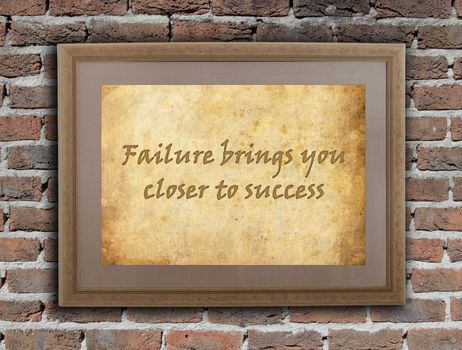“Every failure brings with it the seed of an equivalent success.” ― Napoleon Hill
Learning to accept failure is a valuable skill that can help you to better cope with challenges and setbacks in life, and ultimately become more successful. These are some of the reasons why accepting failure can be beneficial to you:-
- It allows you to learn from your mistakes: By accepting failure and reflecting on what went wrong, you can identify mistakes you made and find ways to avoid making them in the future. This can help you to improve and become more successful in the long run.
- It helps you to develop resilience: When you learn to accept failure, you become more resilient and better able to cope with setbacks and challenges. This can help you to maintain a positive attitude and persevere through difficult times.
- It promotes a growth mindset: When you embrace failure as a natural part of the learning process, you develop a growth mindset, which is the belief that you can improve and grow through effort and learning. This can help you to stay motivated and focused on achieving your goals.
- It allows you to move on: By accepting failure, you can let go of the disappointment and frustration it may have caused and move on to new opportunities. This can help you to stay focused and avoid getting stuck in a negative mindset.
The difference between people who accept their failure and those who do not can be significant in several ways. Here are some key differences:
Mindset: People who accept their failure tend to have a growth mindset, which means they view failure as an opportunity for learning and growth. In contrast, people who do not accept their failure often have a fixed mindset, which means they view failure as a reflection of their innate abilities and are less likely to see it as an opportunity for growth.
Resilience: People who accept their failure are often more resilient than those who do not. They are better able to bounce back from setbacks and challenges, and are more likely to persevere in the face of adversity.
Self-awareness: People who accept their failure are often more self-aware than those who do not. They are able to recognize their strengths and weaknesses, and are more open to feedback and constructive criticism.
Accountability: People who accept their failure are more likely to take responsibility for their mistakes and shortcomings. They are less likely to blame others or make excuses and are more willing to take steps to address their shortcomings and improve.
Perspective: People who accept their failure often have a more positive and realistic perspective on life. They recognize that failure is a normal part of the learning process, and are less likely to be overwhelmed by setbacks and challenges.
Overall, people who accept their failure tend to have a more positive and growth-oriented mindset, which enables them to be more resilient, self-aware, accountable, and perspective in their approach to life’s challenges.
Do not worry if you are not good at accepting failures. You can start learning now. Here are a few strategies that you might find helpful:
- Acknowledge your feelings: It’s normal to feel disappointed or frustrated when things don’t go as planned. Allow yourself to feel these emotions, but try not to dwell on them for too long.
- Reflect on what went wrong: Take some time to think about what led to the failure. This can help you to identify any mistakes you made and find ways to avoid making them in the future.
- Seek feedback: Ask for feedback from others who were involved in the situation. This can help you to understand their perspective and identify areas for improvement.
- Find the silver lining: Try to find something positive in the failure. For example, you may have learned a valuable lesson or gained a new skill.
- Set new goals: Use the failure as an opportunity to set new, achievable goals for yourself. This can help you to stay motivated and focused on moving forward.
Remember that failure is a natural part of the learning process, and everyone experiences it at some point. By learning to accept failure and using it as an opportunity to grow and improve, you can build resilience and become more successful in the long run.




